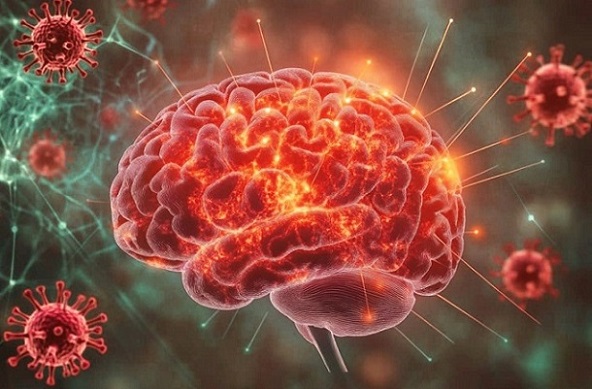New Study Validates That SARS-CoV-2 Infects Brain Neurons Through Cathepsins and Triggers Alzheimer-Like Changes
Nikhil Prasad Fact checked by:Thailand Medical News Team Oct 01, 2025 4 months, 2 weeks, 6 days, 10 hours, 6 minutes ago
Medical News: The Hidden Impact of COVID-19 on the Brain
A new scientific study has confirmed that SARS-CoV-2, the virus responsible for COVID-19, can directly infect brain neurons by using enzymes called cathepsins. More alarmingly, the infection triggers changes in the brain that resemble those seen in Alzheimer’s disease. This
Medical News report explains how the virus exploits brain cells and why this discovery is a major warning for long-term brain health.
 New Study Validates That SARS-CoV-2 Infects Brain Neurons Through Cathepsins and Triggers Alzheimer-Like Changes
New Study Validates That SARS-CoV-2 Infects Brain Neurons Through Cathepsins and Triggers Alzheimer-Like Changes
The research was carried out by scientists from the University of Helsinki in Finland, the University of Queensland in Australia, Assiut University in Egypt, the University of Zurich in Switzerland, and Hamad Bin Khalifa University in Qatar. Their findings shed new light on how COVID-19 could be tied to neurodegeneration and persistent neurological symptoms.
How the Virus Enters Brain Neurons
The study showed that SARS-CoV-2 enters neurons using the endosomal-lysosomal system, a pathway inside cells that depends heavily on cathepsins, particularly cathepsin B. When cathepsin activity was blocked with inhibitors, the virus could not effectively infect neurons. This highlights a potential new treatment approach: drugs that target cathepsins might help protect the brain from viral invasion.
Researchers used lab-grown human neurons and 3D brain organoids to observe this process. They confirmed that both the original Wuhan strain and the newer Omicron variant relied on cathepsins to infect brain cells. The experiments revealed that within 24 hours of infection, neurons released large amounts of infectious virus particles. However, by 72 hours, while viral genetic material was still present, the new viruses became less infectious—possibly due to a natural defense response inside neurons.
Alzheimer-Like Brain Changes
One of the most worrying findings was that infected neurons showed abnormal buildup of phosphorylated tau proteins. This is a hallmark feature of Alzheimer’s disease and other conditions known as tauopathies. In infected neurons, tau proteins became misplaced, moving from their normal locations in axons to the cell body. Such changes are strongly linked to memory loss and neurodegeneration.
The study also reported that infected neurons accumulated a stress-related protein called HIF-1α, even under normal oxygen conditions. Elevated HIF-1α is often associated with brain cell stress, inflammation, and progression of neurodegenerative diseases. Furthermore, SARS-CoV-2 infection led to the release of inflammatory molecules such as MCP-1 and CXCL12, which can recruit immune cells and worsen brain inflammation.
Role of Brain Immune Cells
When microglia—the brain’s immune cells—were added to cultures, they did not become infected themselves, but they reacted strongly to the pr
esence of the virus. Microglia shifted into an activated state, which can promote inflammation and contribute to neuronal damage. Even with microglia present, tau phosphorylation in neurons continued to rise, reinforcing the connection between viral infection and Alzheimer-like processes.
Why These Findings Matter
The results underline that SARS-CoV-2 is not just a respiratory virus but also a neurotropic virus capable of damaging the brain. The discovery that cathepsin enzymes enable viral entry offers a clear target for potential therapies. If drugs can safely block cathepsin activity, they may protect the nervous system from infection and reduce the risk of COVID-19-related dementia-like conditions. These insights are particularly important for long COVID patients, many of whom experience brain fog, memory issues, and neurological decline. The study suggests that without early interventions, COVID-19 could accelerate processes leading to neurodegenerative diseases, making brain health monitoring a critical part of pandemic care.
The study findings were published in the peer reviewed journal: Molecular Therapy – Nucleic Acids.
https://www.sciencedirect.com/science/article/pii/S216225312500280X
For the latest COVID-19 News, keep on logging to Thailand
Medical News.
Read Also:
https://www.thailandmedical.news/news/sars-cov-2-orf6-protein-found-to-kill-human-brain-cells-by-damaging-mitochondria
https://www.thailandmedical.news/news/sars-cov-2-proteins-found-to-damage-brain-cells-and-trigger-inflammation
https://www.thailandmedical.news/news/sars-cov-2-infects-microglia-the-immune-cells-of-the-brain-affecting-long-term-cerebrum-health
